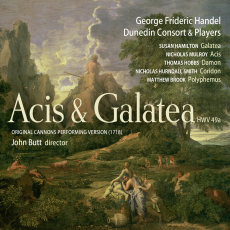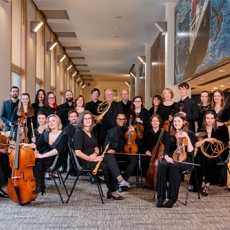Handel's Acis & Galatea - Dunedin Consort - San Francisco Classical Voice
Nymphs and shepherds, unite! Georg Friedrich Händel's path to pastoral bliss beckons in two distinct directions. You can take the composer's original English road of 1718, titled Acis & Galatea, or Mendelssohn's newly resurrected, considerably different German straße of 1828/29, aka Acis und Galatea. Either journey brings rewards, but only one may lead you to paradise.
Thankfully, with the evil Polyphemus disinclined to stray too far from the concert platform, the choice between two recently released recorded versions of Handel's pastoral entertainment is hardly one of life and death. Depending on your preferences, you may even choose both, thereby honoring both spellings of the composer's name: the original German cited above and its English transliteration, George Frideric Handel.
From former Bay Area early music specialist John Butt and the authentic instrument Dunedin Consort & Players of England comes Handel's Original Cannons Performing Version of 1718 (Linn Records). Physically available as a high-resolution SACD (super a compact disc) that will yield multichannel sound on systems so equipped, and state-of-the-art stereo on the rest, this absolutely delicious, irresistible performance also exists as a high-resolution music file downloadable from the label's Web site. Sung in English, with a one-person-to-a-line chorus composed of Handel's five soloists, it purports to reflect the latest research into the scoring that the composer used at the premiere at the palace of Cannons in Middlesex, the country estate of the Duke of Chandos, near London. By referencing a surviving manuscript from a copyist who helped prepare many of Handel's performing scores, Butt deviates from the supposedly latest authoritative edition to change orchestration and instrumentation when he believes that Handel did the same.
From the Bay Area's beloved Nicholas McGegan, NDR Chor, and FestspielOrchester Göttingen comes a far weightier, German language arrangement by Felix Mendelssohn Bartholdy. Dating from 1828/29, it was rediscovered by the Handel Society in Göttingen as late as October 2005. This version, recorded for the first time, was probably performed at the first English presentation of Mendelssohn's version in St. James' Hall, London, in December 1869. The recording, issued by Carus in SACD format, uses four soloists rather than Butt's five, a separate chorus 10 times the size of Butt's, and a sizable orchestra in which authentic instrument sonorities are smoothed over by the sheer mass of sound.
I think you already know where my preferences lie. All you need play is the opening Sinfonia and the start of Galatea's first innocent Air, "Hush, ye pretty warbling choir!" to hear the difference. Butt's woodwinds burble away, chirp, and dance with delight. The contrasting sonorities are delectable.
Irony of ironies, as much as you might expect our Nick to render Mendelssohn's edition as fleet as Peter Pan, there's simply no way to convert 12 violins into four, let alone erase Mendelssohn's violas and other instrumental additions. This isn't a simple case of apples or oranges; Mendelssohn was wheeling a weighty shopping cart around, while Handel was dancing his little picnic basket through the Express line. Not even the presence at Göttingen of such Philharmonia Baroque indispensables as Elizabeth Blumenstock, Lisa Weiss, Phoebe Carrai, and Hanneke van Proosdij can lighten Mendelssohn's far-denser monument to paradise.
Besides the obvious language difference - the Cannons version's clearly enunciated English, which was Handel's language of choice, makes the work far more accessible - there's a huge difference between the vocal soloists. Butt's sound is far more natural and unspoiled. The voice of his Galatea, soprano Susan Hamilton, is kissed with youth. Who would cast off her marvelous "Heart, the seat of soft delight" in favor of the more perfectly sung but far more studied operatic soprano of McGegan's Julia Kleiter? The latter may be the type of voice that Mendelssohn expected to hear. But we, blessed with historic hindsight, need not be limited by such a revisionist vision.
Neither Hamilton nor Butt's Acis, tenor Nicholas Mulroy, has a perfect instrument. Nonetheless, their occasional faltering only adds to the innocence of the presentation. (Butt's Damon, tenor Thomas Hobbs, takes the "flawless tenor" prize.) McGegan's Acis, veteran tenor Christoph Prégardien, is a world-class artist, though he lacks innocence, and his occasional stress on top betrays his age (or at least his limitations).
Butt's hilarious Polyphemus, bass Matthew Brook, is like none I have ever heard. This demon is a paper tiger, a melodramatic terrorist whose cardboard pistol fires off flawless runs rather than piercing rounds. Listen to his entrance, "I rage - I melt - I burn!" and see who falls over first, you from delight or Acis from evil. Want to hear a version of "O ruddier than the cherry" that is so filled with melodramatic mirth that you'll forever scoff at singers who take the character's menace at face value? Brook's Polyphemus is Handel via Gilbert & Sullivan by way of Anna Russell.
You can have your cake and eat it, too. Run, don't walk, to your keyboard or local surviving classical CD vendor and grab Butt's recording. His Handel is fit for paradise.

